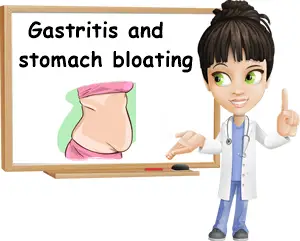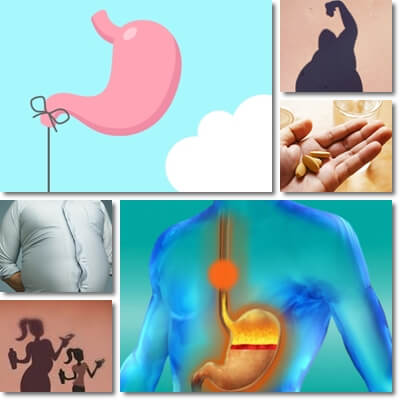Bloating is not necessarily the first symptom associated with gastritis, but it’s one of the most common that occur along with upper abdominal pain and general stomach upset, gas, burping and hiccups or acid reflux. The causes behind bloating can be diverse, ranging from the stomach lining inflammation itself to drinking too many liquids at once, eating the wrong foods or not keeping to a gastritis diet at all. The more severe the gastritis symptoms, the more visible and uncomfortable the stomach distension. Solutions should be tailored to each cause in particular and consider the nature of gastritis as a complex digestive disorder of great specificity.
What causes gastritis bloating and how can you treat it?
1) Inflammation. Bloating often occurs as a side effect of gastritis itself and is a symptom of the inflammation of the stomach lining. A lot of people recently diagnosed with gastritis may experience significant bloating simply because their gastritis went undiagnosed for a while. During this time, the inflammation has had time to worsen, resulting in more severe symptoms, including the bloating.

2) Too much fiber. Bloating in gastritis also occurs as a result of a too high fiber intake. And since even moderately low amounts of fiber can be too much in gastritis, a lot of the foods you eat may be triggering the bloating. For example, while it’s allowed to eat a ripe banana when you have gastritis, that doesn’t mean it won’t trigger bloating, even if it’s one of the very few sources of fiber in your diet. This is why it’s important to adapt your diet to your individual requirements. This could mean you can eat a ripe banana every other day or every two days or twice a week or once a week or none at all, depending on whether or not it’s good for your gastritis.
Some people have the same reaction to apples: even if they eat one or two plain, cooked apples without skin in a week, they may still experience significant bloating from the fiber they do get from the apples. If this is the case, give up apples while you are on your gastritis diet and replace them with ripe bananas or cooked quinces or cooked pears without skin, whatever is good for you and doesn’t trigger symptoms. Avocados, also mentioned in my 1 week gastritis diet plan, can be both good for you, settling in very well after eating and bad for you, causing bloating and acid reflux.
3) Helicobacter pylori infection. H. pylori infections are a leading cause of gastritis worldwide. Unfortunately, both the infection itself and the treatment for it can result in inflammation of the stomach lining and symptoms such as burning sensation, uncontrollable hiccups, upper abdominal pain, frequent indigestion, acid reflux and bloating. The sooner you treat the infection, the better it will be for you.
4) Medication. You can’t treat gastritis without following a gastritis diet plan. Nonetheless, a lot of people only rely on taking the medication prescribed by their doctor and continue to eat as they’ve always eaten. Antibiotics in particular, which are prescribed for Helicobacter pylori infections (usually 2-3 different antibiotics at a time), tend to worsen gastritis symptoms, followed by proton pump inhibitors, when taken for prolonged periods of time without considering the importance of dietary changes.

And it’s fairly common for people who don’t change their diet to continue to have gastritis, despite taking medication as well as experience worse symptoms, including acid reflux, heartburn and bloating. Remember you need a healthy diet tailored to the requirements of the condition in addition to medication for successful treatment of gastritis.
5) Other medication. Anti-inflammatory medication can further irritate the stomach lining and worsen gastritis symptoms, including bloating. It may only take one ibuprofen tablet to trigger your gastritis for a couple of weeks if you are particularly sensitive to the side effects of such medicines. It is recommended to only take medicines if you absolutely have to when you have gastritis to minimize the erosion of the stomach lining and inflammation. If you have essential medication for chronic conditions, then take them according to your doctor’s recommendations. The proton pump inhibitors for gastritis can also help minimize the side effects of certain medication on the stomach.
Dietary supplements and bloating in gastritis. A lot of people with chronic gastritis worry about not getting much nutrition from the limited range of foods they have to eat as well as about not being able to absorb a great deal of the nutrients they do get. Naturally, they consider dietary supplements. But even those can sometimes increase stomach inflammation. Effervescent multivitamins in particular can cause acid reflux and worsen bloating (partly because they need to be taken with quite a lot of water, after eating) and other symptoms. Tablets are better, but the solution is to take them after a substantial meal to both boost absorption of the nutrients and reduce possible side effects on the stomach.
6) Probiotics and probiotic foods. While it’s true that probiotics (live, beneficial bacterial cultures) help digestive health, they are not always good for gastritis. Taking probiotic preparations can sometimes further accentuate digestive discomfort in gastritis and, in some cases, lead to more bloating. We have to keep in mind that most probiotic foods are highly acidic (natural, sour yogurt or sauerkraut or kefir or sour milk) and ferment, causing air in the stomach and bloating. This will lead to acid reflux, stomach distension, hiccups, burping, flatulence and overall worsen gastritis.
While they are undoubtedly healthy, probiotics and probiotic foods are not actually good during acute phases of gastritis when symptoms are at their worst. Instead, it might help to focus on eating a strict diet, take the prescribed medication like proton pump inhibitors to dull down your stomach acidity and allow the stomach lining to regenerate before all else.
Only after healing your gastritis you can start the second phase of boosting digestive health which may consist of eating foods that provide beneficial bacterial cultures and fiber which represents a source of food for beneficial bacteria. However, don’t fill up on yogurt, kefir, cabbage, broccoli or fruits right away. Wait a while, slowly introduce foods into your diet, maybe one a day, see how you feel or else you risk reversing all of your efforts and experiencing gastritis symptoms once more. Everything must be done in a calm and moderate fashion, slowly accustoming your stomach to a new, more varied diet.
7) Too much fluids. Drinking too many fluids at once can actually cause severe bloating. For example, it’s important to stay hydrated, but you might experience stomach distension if you drink a lot of water right before eating or afterwards. What you can do is drink half a glass or a glass of water half an hour before a meal so it has time to settle. Avoid drinking too much water during meals, unless there are emergencies such as food or water aspiration into the lungs. Wait half an hour after eating to drink water again.
Bloating in gastritis can also be caused by eating a liquid diet, often recommended in chronic, erosive gastritis or more liquid foods such as chicken soup. For example, even if it is a good choice of food during gastritis for a lot of people and a chance to eat something different, not just plain white rice with a boiled vegetable, it’s important to not have more than half a bowl of the soup itself in one sitting. And make sure you also eat enough noodles, rice or orzo (risoni) or whatever refined grain you may add to your soup to help absorb some of the liquid and prevent feeling full of liquid, getting stomach acidity and bloating after eating.
Another solution is to walk for half an hour to one hour after eating. Standing as well as moving helps keep food and gastric juices in the stomach as well as helps digestion along, lowering the chances of acid reflux and providing relief for gastritis bloating. Read more about what foods to eat and to avoid for gastritis.
8) Constipation. Bloating and painful stomach cramps in gastritis can be caused by constipation. Because of the low-fiber diet recommended for anyone suffering from gastritis, it is easy to develop constipation and this, in turn, can lead to bloating and pain. The best solution for me was to eat soft foods like soft boiled eggs, boiled chicken legs and boiled vegetables (potatoes, carrots, mushrooms, spinach) in addition to absorbent foods to both get relief from the gastritis itself and prevent constipation. Eating moderate amounts of food, staying hydrated and staying active by walking a lot are good solutions for preventing gastritis constipation. I have also relied on drinking laxative herbal teas with senna leaves, licorice root, fennel seeds, spinach seeds and apple.
Conclusion
No symptom big or small should be disregarded. If you experience bloating constantly and in response to all foods you may eat, it is time to see a doctor and investigate the causes behind it. Only then can you manage the symptom effectively and treat the underlying condition causing it. There are many solutions for bloating in gastritis, including dietary changes, taking a walk after eating and avoiding drinking too much water during a meal or right before it. But you can only take effective action after being given a diagnosis by a doctor, so make an appointment as soon as you can to get started on getting better.
